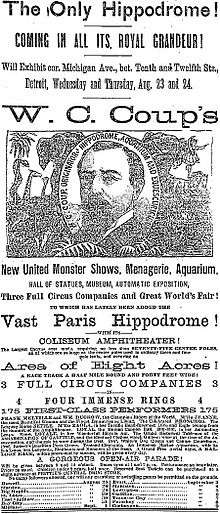William C. Coup
| William Cameron Coup | |
|---|---|
 | |
| Born |
August 4, 1836 Mount Pleasant, Indiana |
| Died |
March 4, 1895 (aged 58) Jacksonville, Florida |

William Cameron Coup (August 4, 1836 – March 4, 1895) was a Wisconsin businessman who partnered with P. T. Barnum and Dan Castello in 1870 to form the "P. T. Barnum's Museum, Menagerie and Circus".[1] Previously Barnum had a museum at a fixed location in New York City and the traveling circus allowed him to bring his curiosities to more paying customers. Coup's innovations were the circus train to transport the materials from town to town.[2] He also came up with the concept of adding a second ring in 1872 and a third ring to the circus in 1881 to allow ;more people to view the events.[1]
Biography
He was born in 1837 in Mount Pleasant, Martin County, Indiana. His father purchased a tavern, which was not what William wished to do with his life. He worked in a country newspaper office as a "devil". However, this was not to his liking either. Coup went to see a show and decided to apprentice himself to the show. In 1853, he joined E. F. & J. Mabie Circus, where he secured sideshow privileges. Between 1866 and 1869, he had similar privileges with the Yankee Robinson Circus. He and Dan Castello formed a partnership that had a show travel by boat in 1869, visiting the ports of the Great Lakes. The show was a success.[3]
Dan Castello suggested he work with P. T. Barnum. In 1870, Castello, Coup and Barnum created "P. T. Barnum’s Grand Traveling Museum, Menagerie, Circus and Hippodrome" in New York City. Coup started to use rail transportation for the circus in 1872, against Barnum's judgement.[2]
In 1874, Coup built the New York Hippodrome as a permanent amusement building. This fatigued him, and in 1875 he ended his partnership in the circus and move to Europe.[3]
In the second quarter of 1876, he returned to the US and formed a new partnership with Charles Reiche to build the New York Aquarium, which opened on October 11, 1976. After a disagreement about opening on Sunday with Reiche, he sold his part at a loss. He then organized "The Equescurriculum" traveling show, which was enlarged yearly until 1879, when it became a consolidated circus as "The New United Monster Shows". In 1883, he established the Chicago Museum in the building then known as McCormick Hall. From 1884 to 1890, Coup was involved with Wild West Shows and trained animal exhibitions.[3] He lost most of his equipment in a train wreck near Cairo, Illinois in 1887. He developed a train-based traveling museum called Enchanted Rolling Palaces in 1891.[3]
He died in Jacksonville, Florida on March 4, 1895.[3]
Circuses
- W. C. Coup's Circus (1885–1889)
- W. C. Coup's Rolling Palaces
- Coup's Equescurriculum
- W. C. Coup's New United Monster Shows
- Coup's 10 Consolidated Shows
References
- 1 2 "History of the Circus". PBS. Retrieved 2012-11-05.
But the bellwether moment in the evolution of the American circus came in 1871 when Phineas Taylor Barnum and William Cameron Coup debuted P.T. Barnum's Museum, Menagerie & Circus. ... Soon, Barnum and Coup were turning away people who flocked to see the exotic animals, sideshow oddities and performances of strength and agility. To remedy this problem, they added a second ring in 1872 and a third ring in 1881, allowing more people under the big top at any given performance.
- 1 2 "Circus: P. T. Barnum's Circus, 1871-1880". The Circus in America. Archived from the original on January 17, 2014. Retrieved 2011-11-20.
Along with William Cameron Coup and Dan Costello, Barnum began P.T. Barnum’s Museum, Menagerie and Circus, a traveling combination of which the “museum” part was an exhibition of animal and human oddities, soon to become an integral part of the American circus known as the Sideshow. In 1872 Barnum and Coup utilized the railroad to transport their show.
- 1 2 3 4 5 Sawdust & spangles; stories & secrets of the circus. Chicago: H. S. Stone and company. 1901. pp. x–xv. Retrieved August 12, 2015.
External links
- Works by William C. Coup at Project Gutenberg
- Works by or about William C. Coup at Internet Archive
- William C. Coup at Find a Grave
|